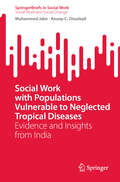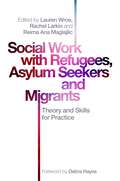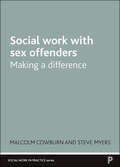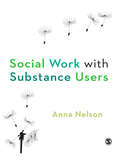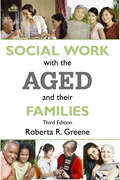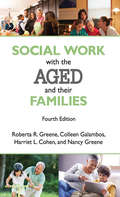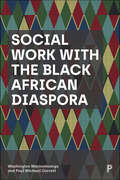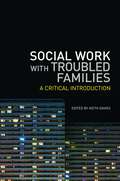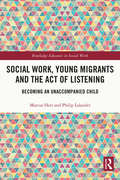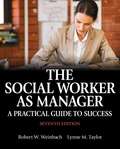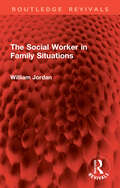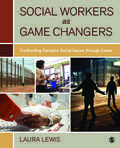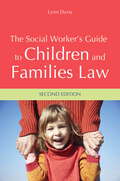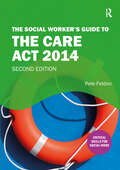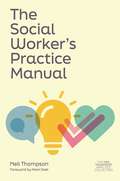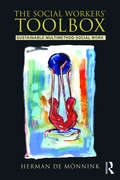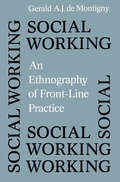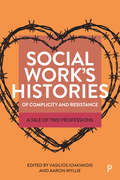- Table View
- List View
Social Work with Populations Vulnerable to Neglected Tropical Diseases: Evidence and Insights from India (SpringerBriefs in Social Work)
by Muhammed Jabir Anoop C. ChoolayilThis book discusses the need to establish social work for Neglected Tropical Diseases (NTDs) with an emphasis on the emerging role of effective and sustainable social interventions for the control and elimination of NTDs. NTDs are a group of infectious diseases prevalent in tropical and subtropical regions, causing significant morbidity and mortality to the world's poorest populations but receiving relatively lesser attention. They significantly affect communities with poor financial resources, inadequate sanitation and limited healthcare facilities, indicating their social dimension. Addressing NTDs requires multifaceted strategies that consider environmental, social, and economic factors, with socioeconomic factors emerging as a critical determinant. The global battle against NTDs has seen significant progress, yet social workers’ involvement remains limited, particularly in high-prevalence regions like India. This stems from undefined roles and a lack of focus within existing NTD frameworks. Integrating social work into NTD intervention is crucial for addressing the diverse challenges associated with these diseases, especially the social dimensions. Social workers, by advocating for health equity, engaging communities, addressing social determinants, and collaborating with healthcare professionals, can contribute significantly to the broader efforts in mitigating the impact of NTDs on vulnerable populations. This book builds on the social nature of NTDs to argue for the case of NTD social work. Establishing NTD social work requires efforts in training, standardising practices, research, advocacy, infrastructure development, and partnerships. Among the topics covered: Neglected Tropical Diseases: A Brief Introduction to the Global Scenario Neglected Tropical Diseases and the Social Dimension of Illness in India Social Work for the Control and Elimination of Neglected Tropical Diseases Towards Sustainable Impact: Future Directions in Social Work for NTD Control and Elimination Social Work with Populations Vulnerable to Neglected Tropical Diseases helps readers to understand the intersectional nature of health inequities and effectively work towards the control and elimination of diseases of poverty, specifically NTDs. The book is useful reading for health social workers, social work educators, healthcare professionals, medical and public health educators, and public policy and health policy researchers.
Social Work with Refugees, Asylum Seekers and Migrants: Theory and Skills for Practice
by Suryia Nayak Lucy Mort Rebecca Yeo Natalia Farmer Jen Ang Anna Gupta Jude Boyles Anna Turner Katy Tolman Hannah Berry Rachael Bee Jo Vincent Elaine Ortiz Annemarie Morsch Joanne Vincett Lynn King Mark Doidge Colin Turbett Durani Rapozo Ana Draper Dan Tucker Marian LiebmannMass-migration, conflict and poverty are now persistent features of our globalised world. This reference book for social workers and service providers offers constructive ideas for practice within an inter-disciplinary framework. Each chapter speaks to a skill and knowledge area that is key to this work, bringing together myriad voices from across disciplines, interspersed with the vital perspectives of asylum seekers, refugees and migrants themselves. The book discusses the specific challenges faced when working in the community, and where people have suffered torture, in the context of social work practiced from an ethical value-base. Staying up to date with the latest developments in policy; and addressing key specific skills needed to work with people affected by borders, this book is a valuable resource for both practitioners and students.
Social Work with Sex Offenders: Making a Difference (Social Work in Practice series)
by Malcolm Cowburn Steve MyersThis topical book engages with a wide range of issues related to social work practice with people who have sexually offended. It addresses the emotional impacts of ‘facing the sex offender’, the importance of values and ethics in practice, and reviews popular and academic understandings of sex offenders and sex crimes. Its accessible style and use of practice based learning exercises will help readers to reflect on theory, practice and developing emotional resilience.
Social Work with Substance Users
by Ms Anna NelsonThis book offers a new approach to help students to understand problematic substance use across a range of social work practice settings. Written from both an anti-discriminatory and evidence-based perspective, the book highlights successful responses to the issues. Each chapter includes reflective exercises and examples of further reading, challenging students to critically reflect on their practice. The book provides a detailed understanding of: " Historical and current policy relating to prohibition and drug use " A range of substances and their potential effects on service users " Models of best practice including screening and assessment, brief intervention, motivation approaches and relapse prevention " Particular issues and needs of a diverse range of service user groups This will be an essential text for social work students taking courses in substance use and addiction. It will also be valuable reading for qualified social workers and students taking related courses across the health and social care field.
Social Work with the Aged and Their Families
by Roberta R. GreeneIn recent years, theoreticians, researchers, and practitioners have become increasingly interested in older adults and the aging process. This volume draws on related disciplines to better understand the biological, psychological, and social aspects of aging. 'Social Work with the Aged and Their Families' covers areas of central interest to those coping with the needs of an aging population. Among the topics addressed are assessment of the aging, taking into account biological age, psychological age, and socio-cultural and spiritual age. Greene also considers the importance of the family system, family roles and development, functional-age individual and family intervention, and group and community interventions. The scientific and systematic study of aging is known as gerontology. Geriatric social workers are those who have applied established social work theories in an attempt to find suitable techniques for working with their elderly clients. The need for specialized services has given birth to various services and programs. For example, meals-on-wheels and home health care services have been designed to meet specific physical needs of older adults. However, mental health services have lagged far behind as practitioners struggled to adapt such specialties as family therapy to families of later years. A major contribution of this book, now in its third edition, is the functional-age model of intergenerational treatment (FAM), which is an outgrowth of that demand. The functional-age model of intergenerational treatment is an integrative theoretical framework for social workers interested in clinical social work practice with older adults and their families. Since its initial construction in 1986, the model has been augmented by more recent concepts related to successful aging, spirituality, and resiliency. These additions, together with the original assessment and intervention strategies, present the major converging conceptual trends that constitute a model for twenty-first century social work practice in the field of aging.
Social Work with the Aged and Their Families
by Roberta R. GreeneSocial Work with the Aged and Their Families presents the functional-age model (FAM) of intergenerational treatment, an integrative theoretical framework for social workers practicing with older adults and their families. In keeping with the Council on Social Work Education's curriculum mandate of 2015, social workers are now encouraged to use human behaviour theories in working with their geriatric clients. This fourth edition incorporates much-needed additional techniques to address the mental health assessments of the elderly. FAM addresses the assessment of older adults' biological, psychological, socio-cultural, and spiritual age. It also incorporates an evaluation of the family system, family roles, and family development in this assessment. Interventions at the individual, family, group, and community levels are discussed. This volume, augmented with recent concepts related to successful aging, spirituality, and resiliency, presents the major converging conceptual trends that constitute a model for twenty-first century social work practice in the field of aging. It is an indispensable text for those training in social work practice with the elderly, or those currently in practice.
Social Work with the Black African Diaspora
by Paul Michael Garrett Washington MarovatsangaSocial work education and interventions with Black African families are frequently impaired because of discrimination, racism and the structuring priorities of neoliberalism. Rooted in rich and fascinating empirical work with practitioners and educators, this urgent, scholarly and accessible book emphasises that ‘Black Lives Matter’. Intent on nurturing more progressive and pluralistic practices in pedagogy and practice, the book is a timely and significant contribution seeking to remake social work approaches to issues of ‘race’, racism and social justice.
Social Work with Troubled Families: A Critical Introduction
by June Thoburn Ian Byford Sadie Parr Keith Davies Anna Matczak Nigel Hall David Holmes Cbe Carol Hayden Craig Jenkins Ray JonesA critical introduction to the Troubled Families Programme (TFP), this book explores the roots, significance and effectiveness of troubled family approaches in social work. An important strand of government social policy, the TFP gives rise to a number of ethical and political questions about assertive outreach, choice, use of power and eliding the structural inequalities which, it is often argued, largely account for the difficulties troubled families face. Social Work with Troubled Families: A Critical Introduction debates these issues, offers an examination of the systemic framework which underpins it and looks at the initiative in a broader context. This interdisciplinary study will be an important resource for social workers, social work students, practice educators and academics for its examination of practice methods. As an exploration of social policy it will appeal to social scientists and to policy makers along with those who seek to influence them.
Social Work with Young People in Care: Looking After Children in Theory and Practice (ISSN)
by Karen Winter Nigel Patrick ThomasThis introduction to social work with children and young people who are looked after (in care or accommodated) by statutory or voluntary agencies is the only textbook on the subject which addresses this area of work across all four nations of the UK.Providing a clear theoretical and ethical basis, it introduces and develops a set of core themes, reflective of contemporary developments including: • the influence of, and tensions between, dominant discourses that shape the social work service (relationship-based practice, early intervention and prevention, social innovation, evidence-based practice and outcomes) • the use and abuse of concepts of ‘children’s needs’ and ‘best interests’; • ideas of parenting and parental responsibility, and the relationships between children, families, communities and the state; • the importance of recognising that children and young people have rights and considering their views; • trauma, trauma-informed practice, transitions and resilience.With chapters addressing a sequence of topics – assessment and planning, residential and foster care, leaving care, and permanence – there is a specific focus on working with disabled children, children from minority ethnic communities, and marginalised groups of children and young people including refugees and asylum seekers, LGBTQIA+ children and those who have been trafficked.Packed full of useful pedagogical features including material on the legal and policy context, summaries of research evidence, notes for good practice, group teaching exercises, references to legislation and guidance, and guides to further reading, it will be core reading on any child and family care modules, general preparation for practice courses, Frontline, Step Up, as well as for all social work practitioners.
Social Work, Young Migrants and the Act of Listening: Becoming an Unaccompanied Child (Routledge Advances in Social Work)
by Marcus Herz Philip LalanderThis book is about 20 young unaccompanied refugees who have sought refuge in Europe and how they experience and try to navigate their new situations, including their contacts with social workers, friends and family members left behind. The book contains stories of powerlessness and frustration from being held under suspicion, from meeting authorities and abstract people of power from "the system," or from constantly being categorized in a static category of "the unaccompanied child." It contains stories of human meetings characterized by thoughtfulness, reciprocity and listening. This book also explores the experiences of meeting social workers as a young migrant in Sweden. The narratives depict how social workers can often reproduce powerlessness and frustration among the young people, but also how there are those social workers who provide something else through the act of listening. By extension, this is a book about society, about how important it can be to reframe people and to listen to their stories, needs and wills. Demonstrating the importance of listening to the stories of young refuges, this title will appeal to students, researchers, community workers and social workers interested in migration, race and ethnicity, youth studies, social work, sociology, anthropology, pedagogy and health.
The Social Worker as Manager: A Practical Guide to Success (Seventh Edition)
by Robert W. Weinbach Lynne M. TaylorThe Social Worker as Manager: A Practical Guide to Success provides an understanding of the functions and responsibilities of managers at any level - from supervisor to executive director. The seventh edition emphasizes how management is an integral part of social work practice and critical to the success of human service programs and services. This title is written for both students and social work practitioners. It describes those management activities that social workers in the public, private and non-profit sectors encounter and how they are shaped by the uniqueness of human service organizations. This edition is easy to read, conversational, and contains many new and revised examples, topics, and practical suggestions based on the experiences of the authors.
The Social Worker in Family Situations (Routledge Revivals)
by William JordanFirst published in 1972, The Social Worker in Family Situations sets out to provide a theoretical basis for the practice of the family casework approach. William Jordan studies those families whose members flee from emotional involvement with each other, stressing their individual autonomy and the dangers of close family ties. He concentrates on the problems of working with these ‘centrifugal’ families, examining the implications of their patterns of interaction not only within the nuclear family group, but also in the extended family, the neighbourhood and the community.The book will be of great interest to all social workers, including those who have practised the family casework approach for many years but have hitherto lacked the benefit of any helpful written guidance.
Social Workers and Compassion
by Stewart CollinsSocial Workers and Compassion is designed to assist social work students, social workers, social work managers, social care workers, and lecturers in developing knowledge, understanding, skills, and values related to various aspects of compassion. Focussing on social work in the UK, the various elements of compassion – compassion, compassion fatigue, compassion satisfaction, self-care, self-compassion, and mindfulness – are clearly located in a systemic, organisational, and structural context. The chapters draw upon evidence-based and evidence-informed sources and present critical perspectives that are linked to existing practices in social work education, social work, and the author’s own experiences. Drawing upon literature from social work and health care, social, organisational, work, and positive psychology, and from sociology and social policy from various parts of the world, the book will be of interest to international social work readers as well as professionals and professionals in training in the criminal justice, health care, counselling, and clinical psychology fields. It will be essential reading for social work students, lecturers, social care workers, social workers, and their managers.
Social Workers as Game Changers: Confronting Complex Social Issues Through Cases
by Laura LewisDesigned to promote active, hands-on learning, Social Workers as Game Changers: Confronting Complex Social Issues Through Cases by Laura Lewis is composed of 11 chapter-length case studies that prepare students to address the types of challenging social issues they will encounter as practicing social workers. The cases—covering topics from immigration, gangs, and education to race, mental health, and end-of-life care—illustrate the interrelationship between the micro, mezzo, and macro levels and facilitate not just recall of facts, but also higher-level learning. Each case allows students to confront realistic scenarios as they evaluate, analyze, and synthesize information, resulting in more engaged and informed classroom discussions.
Social Workers as Game Changers: Confronting Complex Social Issues Through Cases
by Laura LewisDesigned to promote active, hands-on learning, Social Workers as Game Changers: Confronting Complex Social Issues Through Cases by Laura Lewis is composed of 11 chapter-length case studies that prepare students to address the types of challenging social issues they will encounter as practicing social workers. The cases—covering topics from immigration, gangs, and education to race, mental health, and end-of-life care—illustrate the interrelationship between the micro, mezzo, and macro levels and facilitate not just recall of facts, but also higher-level learning. Each case allows students to confront realistic scenarios as they evaluate, analyze, and synthesize information, resulting in more engaged and informed classroom discussions.
The Social Worker's Guide to Children and Families Law: Second Edition
by Lynn DavisNow fully updated and with up-to-the-minute guidance, this is the only book you will need to make sense of the key elements of law involved in social work with children and families in England and Wales. Accessible and jargon-free, this everyday reference explains the fundamental concepts of parental responsibility and human rights, and the provisions of private and public law, including care proceedings and adoption. This second edition incorporates recent changes including the Working Together to Safeguard Children guidance for inter-agency working, the Children and Families Act 2014 and the Crime and Courts Act 2013 as well as the latest case law. Checklists, charts and highlighted points allow for easy reference, and illustrative case scenarios put the law into context. This comprehensive and easy-to-use guide will be an invaluable resource for practising social workers, as well as trainees, students and those studying for post-qualifying awards.
The Social Worker's Guide to Children and Families Law: Second Edition
by Lynn DavisNow fully updated and with up-to-the-minute guidance, this is the only book you will need to make sense of the key elements of law involved in social work with children and families in England and Wales.Accessible and jargon-free, this everyday reference explains the fundamental concepts of parental responsibility and human rights, and the provisions of private and public law, including care proceedings and adoption. This second edition incorporates recent changes including the Working Together to Safeguard Children guidance for inter-agency working, the Children and Families Act 2014 and the Crime and Courts Act 2013 as well as the latest case law. Checklists, charts and highlighted points allow for easy reference, and illustrative case scenarios put the law into context.This comprehensive and easy-to-use guide will be an invaluable resource for practising social workers, as well as trainees, students and those studying for post-qualifying awards.
The Social Worker's Guide to the Care Act 2014
by Pete FeldonThis best-selling book helps social workers gain a comprehensive understanding of how to achieve best practice in applying the Care Act 2014.The Care Act 2014 is a pivotal piece of legislation for adults with social care needs. It is particularly important for social workers, as it sets out the legislative context for the core social work processes that apply to all adults.The Social Worker’s Guide to the Care Act 2014 is a thoughtfully crafted resource that places social workers at the centre of the legal landscape. It takes a distinctive approach by honing in on what truly matters to social workers: assessing needs and formulating care and support plans that align with eligible requirements.Through a blend of key concepts, case examples, and critical evaluation, the book enhances legal literacy in a way that empowers social workers. It equips social workers with a clear understanding of the legal framework within which they operate, enabling them to make informed professional judgements and apply their expertise effectively.This eagerly awaited second edition reflects extensive revisions based on valuable insights derived from judicial reviews, Ombudsman decisions, and in-depth research. Drawing from the author's extensive experience in providing training on the Care Act, the revised edition introduces two new sections that delve into the realms of professional judgement and defensible decisions—essential areas of focus for social workers. Additionally, it incorporates the amendments made to the Care Act 2014 by the Health and Care Act 2022.This substantially revised second edition of The Social Worker's Guide to the Care Act 2014 will be your invaluable companion in navigating the complexities of social work and will be a source of knowledge, empowerment, and guidance.
The Social Worker's Practice Manual (The Neil Thompson Practice Collection)
by Neil ThompsonAn essential handbook for students and experienced social workers alike, this practical guide filters out the jargon and sets out what you really need to know. 30 easy-to-follow chapters delve into topics ranging from holistic thinking to effective record keeping, all rooted in Neil Thompson's extensive hands-on experience. Complicated subjects such as cultural sensitivity and managing conflict are discussed thoughtfully and pragmatically, helping you understand the roots of tricky situations and find effective solutions. Each section successfully combines theory and practice to give a holistic view of social work that can be tailored to help each unique client. Over 45 years of experience distilled into one manual for success.
The Social Workers' Toolbox: Sustainable Multimethod Social Work
by Herman de MönninkThe Social Workers' Toolbox aims to bring order to the diversity of tools which are so characteristic of social work: assessment tools, practice tools and outcome-measurement tools. The tools described in this Toolbox can be directly put into practice and adapted to the social workers’ personalized approach with their individual clients and their environments. The underlying meta-theory for Sustainable Multimethod Social Work is the ‘PIE-Empowerment Theory’. This theory defines social work practice in terms of the partnership between social worker and client and is aimed at enhancing quality of life through systematically and sustainably addressing human needs and human rights. The multimethod model promotes the flexible combination of well-written evidence- and practice-based tools. Packed full of useful checklists, the Toolbox is ideal reading for both inexperienced and more practiced social workers. The book provides a solid basis through the use of practical examples. For the more experienced social worker it offers a substantial resource and the means to legitimize a chosen course of action and social work intervention. Schools of social work will be able to use the book as an easily accessible resource for social work assessments, interventions and quality social work management.
Social Working
by Gerald A.J. MontignyIn this unique work directed at social workers, Gerald A.J. de Montigny maintains that they, along with other professionals, create an `institutional' reality through their day-to-day practices. He traces the practical ways that social workers, when involved in child protection, struggle to produce a world which can be ordered, systematized, and subjected to their powers. It is a penetrating and sensitive analysis of how social workers in their everyday practice make sense from a confusing collection of case details to create organizationally defined problems and cases. De Montigny uses the tension between his experience of growing up 'working class' and the difficult process of becoming a social worker to explore the practical activities professionals use to secure organizational power and authority over clients. This tension has forced him to confront the dilemma of how to stand on the side of clients when standing inside professional and organizational realities.In the first half of the book, de Montigny focuses on the practices social workers use to produce a universalized professional form of knowledge. He examines social workers' use of ideological practices; fetishization of the social work profession; insertion of details from clients' lives into discursive order; accounting for front-line practice as a problem solving scientific practice; and naming of their own frustrations, conflicts, tensions, and pain as professionally manageable phenomena. In the second half of the book, based on his own work in child protection, he systematically examines how such reality-producing practices come to be expressed as child protection. He develops a synthetic account of his social work interventions on cases of child abuse and neglect. This book should be read by all practitioners and students of social work. It is an original and practical application of theoretical arguments to the everyday reality of social work.
The Social Workout Book: Strength-Building Exercises for the Pre-Professional
by Dr Alice A. LiebermanThis Second Edition engages introductory social work students in hands-on, collaborative exercises focusing on four key areas in the curriculum: Social Welfare (History, Politics, Policies, and Services); The Social Work Profession; The Practice of Social Work; and A Vision for the Future. Throughout, this workbook challenges students to form their own opinions on many heated debates within key topics and helps them to apply key concepts and theories, creating enthusiasm about the field while helping to develop critical thinking skills.
Social Work’s Histories of Complicity and Resistance: A Tale of Two Professions
by Vasilios Ioakimidis and Aaron WyllieSocial work is often presented as a benevolent and politically neutral profession, avoiding discussion about its sometimes troubling political histories. This book rethinks social work’s legacy and history of both political resistance and complicity with oppressive and punitive practices. Using a comparative approach with international case studies, the book uncovers the role of social workers in politically tense episodes of recent history, including the anti-racist struggle in the US and the impact of colonialism in Australia, New Zealand and Canada. As the de-colonisation of curricula and the Black Lives Matter movement gain momentum, this fascinating book skilfully navigates social work’s collective political past while considering its future.
The Social World of Intellectuals in the Roman Empire
by Kendra Eshleman"This book examines the role of social networks in the formation of identity among sophists, philosophers, and Christians in the early Roman Empire. Membership in each category was established and evaluated socially as well as discursively. From clashes over admission to classrooms and communion to construction of the group's history, integration into the social fabric of the community served as both an index of identity and a medium through which contests over status and authority were conducted. The juxtaposition of patterns of belonging in Second Sophistic and early Christian circles reveals a shared repertoire of technologies of self-definition, authorization, and institutionalization, and shows how each group manipulated and adapted those strategies to its own needs. This approach provides a more rounded view of the Second Sophistic and places the early Christian formation of "orthodoxy" in a fresh context"--
The Social Worlds of Nineteenth-Century Chamber Music: Composers, Consumers, Communities
by Marie Sumner LottMarie Sumner Lott examines the music available to musical consumers in the nineteenth century, and what that music tells us about their tastes, priorities, and activities. Her social history of chamber music performance places the works of canonic composers such as Schubert, Brahms, and Dvorák in relation to lesser-known but influential peers. The book explores the dynamic relationships among the active agents involved in the creation of Romantic music and shows how each influenced the others' choices in a rich, collaborative environment. In addition to documenting the ways companies acquired and marketed sheet music, Sumner Lott reveals how the publication and performance of chamber music differed from that of ephemeral piano and song genres or more monumental orchestral and operatic works. Several distinct niche markets existed within the audience for chamber music, and composers created new musical works for their use and enjoyment. Insightful and groundbreaking, The Social Worlds of Nineteenth-Century Chamber Music revises prevailing views of middle-class influence on nineteenth-century musical style and presents new methods for interpreting the meanings of musical works for musicians both past and present.
